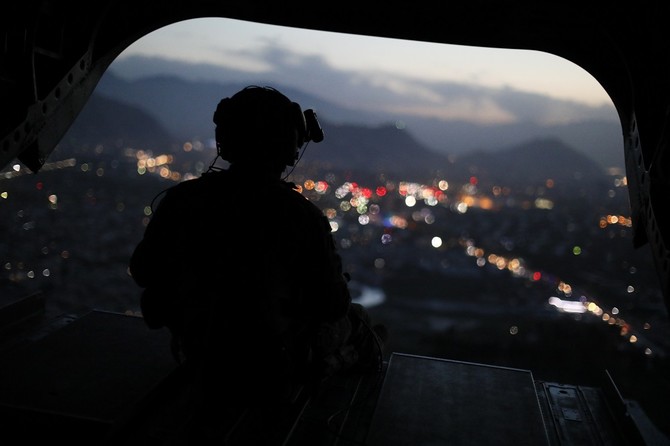ISLAMABAD, KABUL: Putting an end to speculations surrounding the content of discussions that took place between representatives of the US and the Afghan Taliban during the two-day talks in the UAE, the militant group said on Wednesday that the “focal point of the discussion” was the “withdrawal of foreign troops".
The statement further rejected reports that a ceasefire, formation of an interim government, and parliamentary elections in Afghanistan were discussed between the two parties.
Zalmay Khalilzad, the US' special envoy for Afghan reconciliation, led the delegation for the talks which began on Monday in the presence of officials from Pakistan, Saudi Arabia, and the UAE.
After the meetings, he had tweeted that the two-day talks, to promote intra-Afghan dialogue in order to end the conflict in Afghanistan, had been productive.
Khalilzad flew into Pakistan where he met the army's top commander, General Qamar Javed Bajwa in Rawalpindi, with the military spokesman's saying that matters of regional security and the Afghan peace process were discussed.
“Visiting dignitary appreciated Pakistan's efforts for the Afghan peace process. The COAS (Chief of the Army Staff) reiterated that peace in Afghanistan is important for Pakistan and assured cont efforts for bringing peace and stability in the region,” the spokesman tweeted.
He added that both sides discussed measures to create underlying conditions for peace and reconciliation in Afghanistan after 40 years of conflict.
Earlier in the day, Taliban spokesman Zabihullah Mujahid said no talks had taken place with the Kabul administration and that other issues would not be discussed because the “root cause of all problems and the biggest obstacle to peace is the occupation of Afghanistan and bringing it to an end".
He added that any future negotiations would take placd after deliberations and consultations with the respective leadership from both sides.
Mujahid said that the Taliban representatives presented “documented information and proof to the participants about indiscriminate bombings against civilians and demanded its immediate halt. Talks were also held about humane treatment of prisoners and their freedom, a matter that shall be taken into consideration".
Another Taliban official, privy to the discussions that took place in the UAE, said that the US had called for the release of two professors from the American University of Kabul, who were kidnapped in 2016 and were in the Taliban's custody.
He added that US officials reiterated their longstanding concerns about the imminent threats to Washington from Afghanistan and that the Taliban assured them that their “activities are only limited to Afghanistan".
The official, who did not want to be identified, told Arab News that the Taliban's chief, Maulvi Habitullah, had authorized senior officials -- including former ministers Amir Khan Mutaqi, Mullah Abbas, and other senior leaders Siddiqullah, Hafiz Yahya Haqqani, Saadullah Hamas and Dr Faqeer -- to participate in the talks.
“As far as the results of these negotiations are concerned and how effective they shall prove in finding a peaceful solution to the continuing problems will be answered in the upcoming weeks and months,” the Taliban posted on their official website on Tuesday.
In Kabul, Omer Daudzai, Afghan President Ashraf Ghani’s newly-appointed envoy told a gathering on Wednesday that "work on the peace deal will begin in the near future". He gave no further details.
Due to the sensitive nature of the talks, no formal details of the meeting have been made available to the public yet. However, Reuters quoted a Taliban source on Tuesday when it reported that the Taliban had discussed conditions for a truce, swapping of prisoners, and the formation of an interim government with the US officials.
The reports, however, were rejected by Mujahid. “Reuters News Agency has been publishing false reports since yesterday about the meeting taking place between representatives of the Islamic Emirate and the United States in the United Arab Emirates,” he said.
“Talks in Abu Dhabi are taking place with the United States about ending the occupation and American intervention. Nothing about an interim government, ceasefire, elections nor any other internal issue is being discussed, rather the main topic is the American occupation,” he added.
The US embassy in Kabul said Khalilzad arrived in Kabul on Wednesday to update President Ashraf Ghani and Chief Executive Dr Abdullah Abdullah on his engagements with regional partners and other interested parties to reach a negotiated settlement to the conflict in Afghanistan.
Khalilzad arrived in Kabul after three-days of meetings in Abu Dhabi, including the fourth round of quadrilateral meetings between the United States, Afghanistan, the United Arab Emirates, and Saudi Arabia, a statement said.
The meetings were a part of efforts by the United States and international partners to promote an intra-Afghan dialogue aimed at ending the conflict in Afghanistan.




























